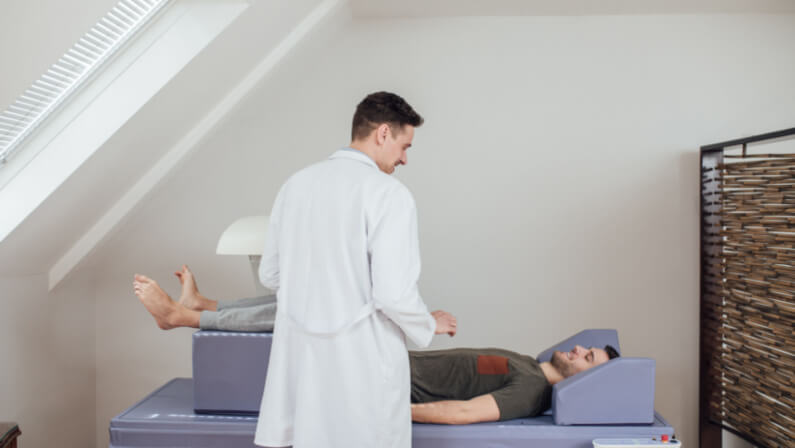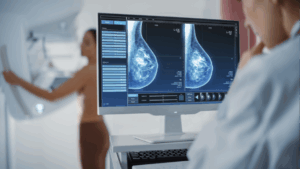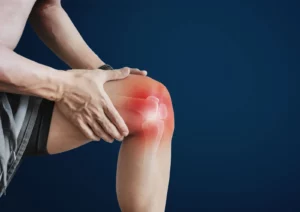Do you have a bone fracture due to a bad fall? Are you already at risk of osteoporosis?
DEXA scan is an effective way to know if you have any of these conditions. This simple and quick imaging test measures your bone density.
It is a helpful method for early diagnosis, prevention, and management of common bone problems and reveals the condition of your overall bone health.
If you are wondering more about what it is about, this article tackles what a DEXA scan is used for and what to expect during the procedure.
What are DEXA scans
A DEXA scan, or dual-energy x-ray absorptiometry scan, is a medical imaging test that finds your bone mineral density. Also known as a DXA scan or a central DEXA scan, it is a non-invasive test that evaluates your risks for osteoporosis or a bone fracture.
The test works by having very low levels of two X-ray beams targeting the bones, which accurately detects bone changes as small as 1%.
A DEXA scan presents more detailed information about bone density than a regular X-ray that is only limited to showing up to 40%.
How Does a Dexa Scan Work
A DEXA scan is a convenient procedure that will not leave you in discomfort. The simple and quick process will only require a few minutes of your time.
- A medical staff member, specifically a radiographer, will ask you to lie on a DEXA x-ray table. You will be instructed to lie in the desired position using foam blocks to support your body during the scan.
- The DEXA machine’s arm will pass over your body with two x-ray beams with little radiation. The beam also helps determine bones from other tissues.
- In the scanner, data will show in graphs and pictures your bone density measurement.
- The data by the radiologist will be given to your physician with initial impressions.
- Your doctor will discuss the interpretation and the recommended treatment plan for your condition.
What’s The Purpose Of The Scan?
A DEXA scan is a helpful test to know your risks of fracture or osteoporosis and if you need medication to delay bone loss.
Additionally, the scan is also used in series for a more straightforward assessment of treatment for those who already have osteoporosis.
Who gets a DEXA scan?
Your doctor will require a DEXA scan if you have at least one risk factor for a weakening bone.
These are the risks factors for a DEXA scan:
- Age. Aging affects bone mass. According to the National Osteoporosis Foundation, women aged 65 and older need to undergo a scan for bone density measurement. Men need to consider a scan by age 70 and older.
- Family history. You are a candidate for a test if you have at least one family member who has osteoporosis.
- Previous bone injuries. You might be at risk if you have fracture injuries after age 50.
- Medications. Some drugs can affect your bones and make them weaker such as medications for cancer and organ transplant.
- Underlying medical conditions. Dealing with a specific disease such as diabetes, lupus, kidney disease, and rheumatoid arthritis can pose a risk to your bones.
How Often To Get Dexa Scan
The recommended frequency for a DEXA scan is one every two years.
A DEXA scan is a vital step to knowing your bone health condition, and your doctor will be the one who will determine when you are due for a test.
Your healthcare provider shall consider your condition, risk factor, and current medications before scheduling you for a DEXA scan.
How To Prepare For A DEXA Scan
A DEXA scan is like a typical X-ray procedure that does not require special preparation.
The following are some information the medical staff may ask before you undergo the procedure. Make sure to provide accurate information.
- Menstruation. You will be asked when was the last date of your monthly period. Your menstrual cycle may affect and mislead the scan results due to hormonal changes in the body.
- Bone treatment. Inform the medical personnel of any ongoing bone-strengthening treatment.
- Medications. Notify the staff if you are under medications that may thin the bones, such as steroids.
- Smoking. Tobacco use may cause an imbalance in bone health. Discuss this with your physician before the procedure.
- Alcohol. Consumption of alcoholic beverages also affects the result of the scan.
- Pregnancy. If you are pregnant or suspect you are pregnant, inform your doctor immediately so they can advise another option. A DEXA scan can affect the developing baby’s health due to radiation.
Is A DEXA Scan Painful?
DEXA scan is non-invasive and is generally a painless and convenient imaging test.
However, you may feel a slight discomfort depending on the position you are required to take as you lie on the table. You will have to hold on to that position for several minutes.
Types Of DEXA Scans
If your doctor decides for a DEXA scan to assess your bone density, you may be required to undergo any of its two types.
Central DEXA
A scanning machine that captures accurate images of your lower spine and hip. You will be asked to lie on the scanning table as the machine’s arms pass over your body. You can take this scan without having to undress.
Peripheral DEXA
A scan that uses a smaller machine to assess the smaller parts of your body, such as your wrist, fingers, heel, and leg.
Due to its more effortless mobility, this DEXA scan is often seen in pharmacies, health fairs, healthcare offices, and even shopping malls.
One Step Diagnostic offers these two types of DEXA scans. Call us to book an appointment at our locations in Houston, Sugar Land, Dickinson, and The Woodlands, TX.
How Much Does A DEXA Scan Cost
The cost for a DEXA scan is determined on a case-to-case basis. Most health insurances cover a DEXA scan, depending on their internal regulations.
You may have to call your health insurance provider to learn more about the estimated coverage of a scan.
One Step Diagnostic provides DEXA scans for people at risk of fractures and osteoporosis. Our results are fast, which assists our doctors in devising a personalized treatment plan more easily and accurately.
Call us today if you want to know how much a DEXA scan costs at One Step Diagnostic. Our representative will gladly assist you on how to get started with our diagnostic service.
What To Expect From A DEXA Scan
The procedure for a DEXA scan is straightforward. But if it is your first time, it pays to set your expectations and come prepared for a smoother process.
Before the procedure:
- Inform your healthcare provider about any underlying medication condition you have. You also need to inform them if you are pregnant.
- Bring the DEXA scan request and other medical information given to you by your healthcare provider.
- Fill out the form to be provided to you by the medical staff. Make sure to provide the information accurately.
- Wear loose and comfortable clothes. Avoid wearing clothing with zippers, metals, and buttons, as the medical staff will likely advise you to remove them. You may also leave your jewelry at home.
- You may also be advised to remove your eyeglasses, hearing aid, or dental devices.
- Do not take any calcium supplements at least 24 hours before the scan.
During the procedure:
- You will be asked to put on a laboratory gown.
- The radiologist will ask you to lie on the machine table with your legs on a padded box.
- Keep your position in place. Let the medical personnel know if you are uncomfortable, as they may place a foam for added support.
- You need to hold your breath for several seconds while the scan is ongoing. This will prevent the images from becoming blurry.
After the procedure:
- The procedure may last from 15-20 minutes only.
- The radiologist will interpret the results and give them to you after a couple of hours.
- The results will show the T-score and the Z-score. The T-score refers to your bone density compared to the peak bone density suitable for your gender. Meanwhile, the Z-score refers to your bone density compared to the bone densities of other people of the same gender and age.
- Once your doctor interprets the result, they will devise a personalized plan to treat any complication you may have.
Your doctor may ask you to take other types of medical examinations, or he may start prescribing medicines. A list of preventive measures may also be given to you to avoid the possibility of fractures.
You need to attend a series of regular follow-up checkups with your doctor to see if there are any changes to your bone health.
Benefits Of DEXA Scan
A DEXA scan is a helpful test that determines your current bone health and prevents any bone-related problems that may arise in the future.
- Detection. The procedure determines your weak and brittle bones. It can also predict future risks, which you can prevent through treatment.
- Bone health assessment. A DEXA scan evaluates your bone health and provides information on whether a medication has helped improve your bone’s strength.
- Management. A scan provides your healthcare provider with the right information as they make a health plan to improve your bone density. A treatment plan also prevents future bone fractures that may worsen your condition.
Risks of DEXA Scan
DEXA scan is a safe imaging test that uses very low radiation compared to a typical chest x-ray.
However, consult your doctor for an alternative option if you are pregnant or suspect you may be pregnant.
Your healthcare provider may likely advise you to wait after giving birth before undergoing a scan to avoid complications in the developing baby.
How Long Does A DEXA Scan Take
It does not require hospital admission and will not give you any downtime after the procedure.
You can easily insert a DEXA scan into your busy schedule. A DEXA scan can last from 10 to 30 minutes.
How Accurate Is A DEXA Scan?
Experts consider a DEXA scan as the gold standard for bone density measurement. It accurately presents detailed images to determine bone and body composition.
Trusted DEXA Scan Center
One Step Diagnostic is a premier medical facility for DEXA scans in n Houston, Sugar Land, Dickinson, and The Woodlands, TX.
Our DEXA Scan results help your doctor diagnose osteoporosis or any risk for a bone fracture. We give results right away so your doctor can make an immediate treatment plan for you.
Are you at risk of a fracture or osteoporosis? Call us at One Step Diagnostic to book a DEXA scan today.




